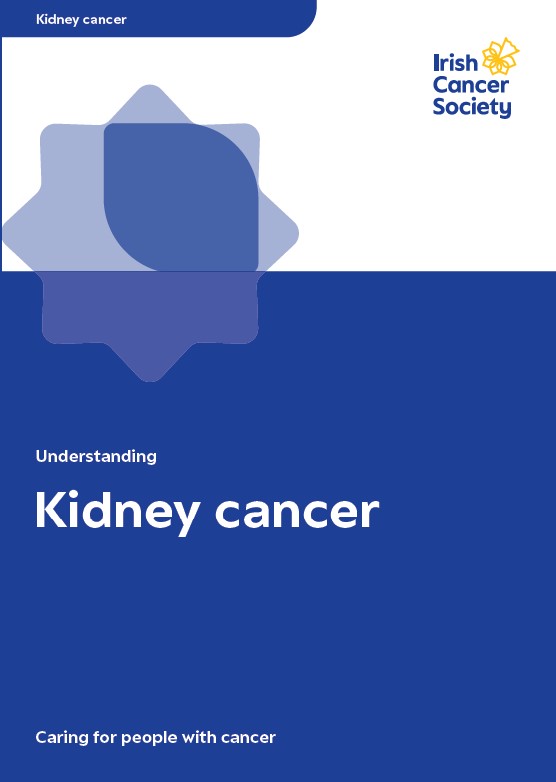Kidney cancer
About 630* people are diagnosed with kidney cancer each year in Ireland. It is more common in people aged over 40.
Signs and symptoms
Learn about the signs and symptoms of kidney cancer. You are more likely to survive cancer if you find it at an earlier stage.
Treatments
There are a number of different treatments available for kidney cancer. Your medical team will explain the best treatment options for you.
What is kidney cancer?
Kidney cancer starts when cells in the kidney change and grow in an abnormal way. They form a mass or tumour within your kidney. Sometimes more than one tumour can develop. As the cancer grows it can affect how your kidney works.
About 630 people are diagnosed with kidney cancer each year in Ireland.*
Usually only one kidney is affected. As the cancer grows it can affect how your kidney works and can cause problems. In most cases, the cancer is found before it has spread to other organs.
What are the types of kidney cancer?
Renal cell cancer is the most common type of kidney cancer in adults – it accounts for about 9 out of 10 kidney cancers. There are different types of renal cell cancer – clear cell renal cell cancer is the most common. Renal cell cancer is also known as renal cell adenocarcinoma.
This is also known as transitional cell cancer (TCC). This is a rare type of kidney cancer that affects the renal pelvis. This is the part of your kidney that collects urine before it drains into your bladder. This cancer behaves in a different way to renal cell carcinomas and usually needs different treatment.
The most common type of childhood kidney cancer. It is also known as nephroblastoma and is very rare. It is not like adult kidney cancer and the tests and treatment for it are different.
What are the kidneys and what do they do?
The kidneys are small bean-shaped organs that lie at the back of your body, just below your ribcage, one on each side. There are normally two kidneys in your body, but you can survive with one. On top of each kidney is a tiny gland called the adrenal gland.

The kidneys filter your blood to remove waste products. These waste products are then made into urine.
The urine is carried from each kidney through a tube called a ureter to your bladder. Your bladder stores the urine until it is ready to leave your body - through another tube called the urethra.
- Erythropoietin tells your bone marrow to make more red blood cells.
- Renin controls your blood pressure.
- Calcitriol is a form of vitamin D that helps your bowel to absorb calcium from your food. This keeps your bones healthy.
- Cortisol is a natural steroid involved in your response to stress and inflammation.
- Aldosterone controls your body’s water balance.
- Adrenaline and noradrenaline prepare your body for emergency situations. For example, by increasing your heart rate and raising your blood pressure.
What increases my risk of kidney cancer?
Risk factors that can increase your chance of developing kidney cancer include:
It is more common in people over the age of 40.
Kidney cancer is about twice as common in men as in women.
If you are black, you have a slightly higher risk of kidney cancer. The reasons for this are not clear.
Doctors believe obesity causes changes in certain hormones that can lead to kidney cancer.
The more you smoke, the bigger the risk. Your risk drops if you stop smoking, but it is still higher than that of a non-smoker.
Being exposed to asbestos, cadmium, some herbicides, benzene and organic solvents like trichloroethylene increase the risk.
You may inherit from your parents a tendency to develop certain types of cancer. Some rare inherited conditions, like Von Hippel-Lindau disease, can cause kidney cancer. However, this is not common.
If you have a strong family history of kidney cancer, your chance of developing the disease is higher.
For example, high blood pressure. It is not certain if the blood pressure, the drugs to treat it, or both, may be the cause. If you have advanced kidney disease, especially if you need dialysis, you also have a higher risk of developing kidney cancer.
Having a risk factor doesn’t mean you will get cancer. Sometimes people with no risk factors get the disease. If you’re worried, talk to your GP or talk to one of our cancer nurses. Call our Support Line on 1800 200 700 or visit a Daffodil Centre.
Reducing your risk of kidney cancer
The most important things you can do to reduce your risk of kidney cancer are:
- Keep a healthy weight for your height
- Stop smoking
- Let your doctor know if you have any hereditary causes of kidney cancer. Some doctors may advise you to have regular tests such as CT scans.
Medical content updated from our 'Understanding kidney cancer' booklet (2025) reviewed by: Prof Barry McGuire, Consultant Urological Surgeon; Dr Robert Keenan, Urology Specialist Registrar; Denise Murray, Uro-Oncology Clinical Nurse Specialist; Karen Fitzmaurice, Daffodil Centre Nurse.
Talk to a Cancer Nurse

Support Line
Our Daffodil Centres

*The Irish Cancer Society uses the most up-to-date cancer statistics from the National Cancer Registry Ireland, available on www.ncri.ie

